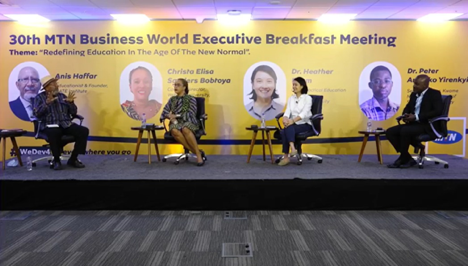Approximately 70 percent of basic school teachers enrolled in a Science, Technology, Engineering, and Mathematics (STEM) training programme organised by the Practical Education Network (PEN) have expressed concerns over access to reliable and cost-efficient data, stating that it could have significant bearing on their ability to conduct digital learning, Founder of PEN and lecturer at the Ashesi University, Dr. Hearther Beem, has said.
According to her, further interaction with the teachers pooled from public primary and Junior High Schools in the Ahanta West and Nzema East districts of the Western Region as well as Kumasi in the Ashanti Region, revealed that less than 30% of them had used any online communication platform for educational purposes and less than 20% said that they had partaken in an online course or training session.
Speaking as a panelist at the MTN Business Breakfast Meeting – the 30th in the series and third for the year – Dr. Beem bemoaned the lack of exposure of an appreciable number of basic school teachers to tools required for learning under the ‘new normal’.
“This is a stark realisation that the teachers themselves are in dire need of exposure and are unfamiliar with these online tools. If the teachers cannot speak the digital language, it is going to be hard to build a rapport with the learners and for me, this is a key thing we have to look at. The teachers need orientation on how they can leverage some of these platforms,” she said.
She added that this is of utmost importance as it would be a fundamental flaw in the educational set up to attempt reaching the students directly, and in the process sidelining the teachers.
“We need to focus on teachers, especially as there is keen interest on their part to be better equipped with online learning tools. Trying to reach students directly is hard and may not be effective if we skip over the teachers.”
Taking her turn, Campus Director of the Webster University – Ghana, Christa Sanders Bobtoya cautioned against treating digital learning as a substitute for traditional in-person learning but rather, it should be considered a complement.
“We have learnt that the best approach is to have a hybrid, a blend, where students can also be in the classroom and also experience the great technology that we have outside the classroom,” she noted as she called for an alternation between different kinds of activities during and outside the lecture hours as a means of combatting distant learning fatigue.
The Breakfast Meeting, which was held under the theme ‘Redefining Education in the Age of the New Normal’, also had as part of its panel, Educationist and Founder of the GATE Institute, Anis Haffar as well as a Senior Lecturer from the Department of Mathematics at the Kwame Nkrumah University of Science and Technology (KNUST), Dr. Peter Amoako Yirenkyi.










